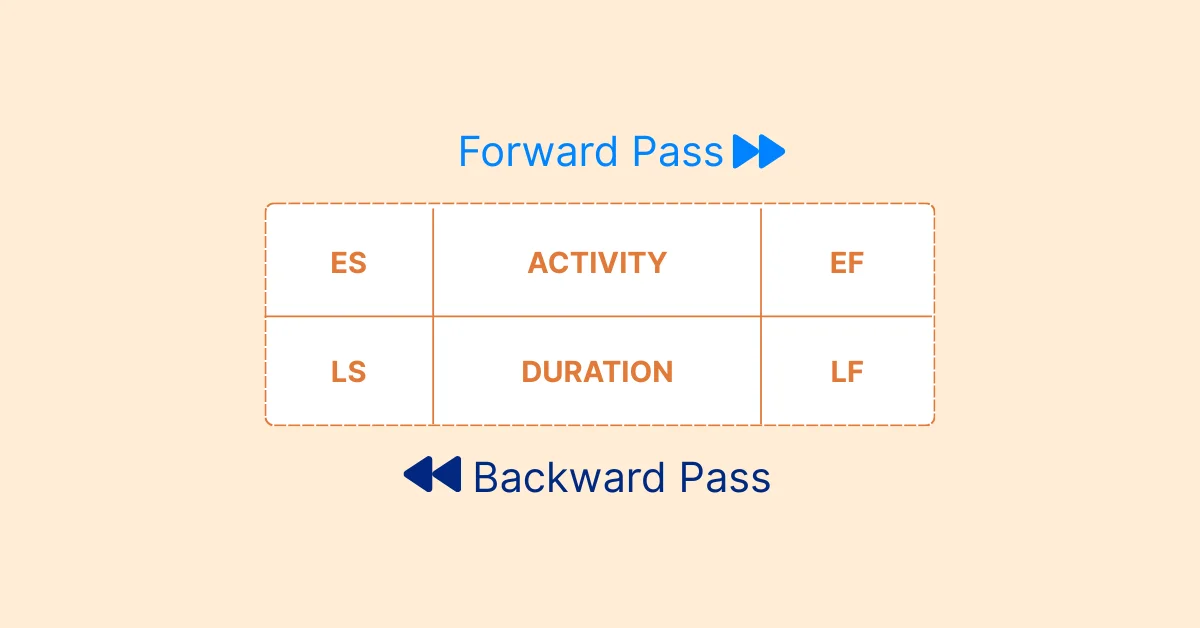What Are the Best Jira Alternatives for Scrum Teams?
Explore the best Jira alternatives for Scrum teams to streamline sprints, manage backlogs, and improve agile workflows.
Scrum teams work best when they have the right tools to plan sprints, manage backlogs, and track progress. For years, Jira has been the default choice—it’s powerful, flexible, and built with agile in mind.
But not every team feels at home with Jira. Some find it too complex, others say it slows them down, and the cost can add up quickly as teams grow. If all you need is a clear way to run sprints and keep work visible, Jira might feel like more than you bargained for.
That’s why many Scrum teams look for Jira alternatives—tools that are simpler, lighter, or better aligned with how they work. In this article, we’ll look at the best options out there, highlight their strengths, and help you figure out which one could be the right fit for your team.
What is Jira?
Jira is a project management and issue-tracking tool developed by Atlassian. It was originally built for software developers to track bugs, but over time, it has grown into one of the most widely used platforms for agile project management.

For Scrum teams, Jira provides features like:
- Backlog management to organize and prioritize user stories.
- Sprint planning to schedule work in short cycles.
- Scrum and Kanban boards to visualize progress. Reporting tools such as burndown chart and sprint velocity charts.
Because of these capabilities, Jira has become the go-to tool for many agile organizations. However, its broad feature set and flexibility often come with a downside: it can feel overwhelming, especially for smaller Scrum teams that only need the basics.
(Related reading: Agile Project Management with Scrum)
Common Drawbacks of Jira for Scrum Teams
Jira is packed with features, but that doesn’t mean it works smoothly for every Scrum team. Many teams find that the tool comes with challenges that can slow them down instead of helping them move faster. Some of the most common drawbacks include:
- Complex setup and configuration – Jira can take a lot of time to customize before it matches how your team actually works.
- Steep learning curve – New users often struggle to navigate the interface, which can make onboarding slower.
- Too many features for small teams – Scrum teams that just need a backlog and a board may feel overwhelmed by the number of options.
- Costs that grow with your team – Jira’s pricing can become a concern as your team scales or if you need multiple add-ons.
- Rigid workflows – While Jira is customizable, it can sometimes feel heavy and less flexible compared to newer, lightweight alternatives.
For Scrum teams that want speed and simplicity, these issues are often the reason they start looking for Jira alternatives.
What Scrum Teams Need in Jira Alternatives
When Scrum teams search for Jira alternatives, they’re usually looking for tools that make agile practices easier—not more complicated. The right tool should support core Scrum activities while staying simple enough for everyone on the team to use confidently.
Key things Scrum teams typically need include:
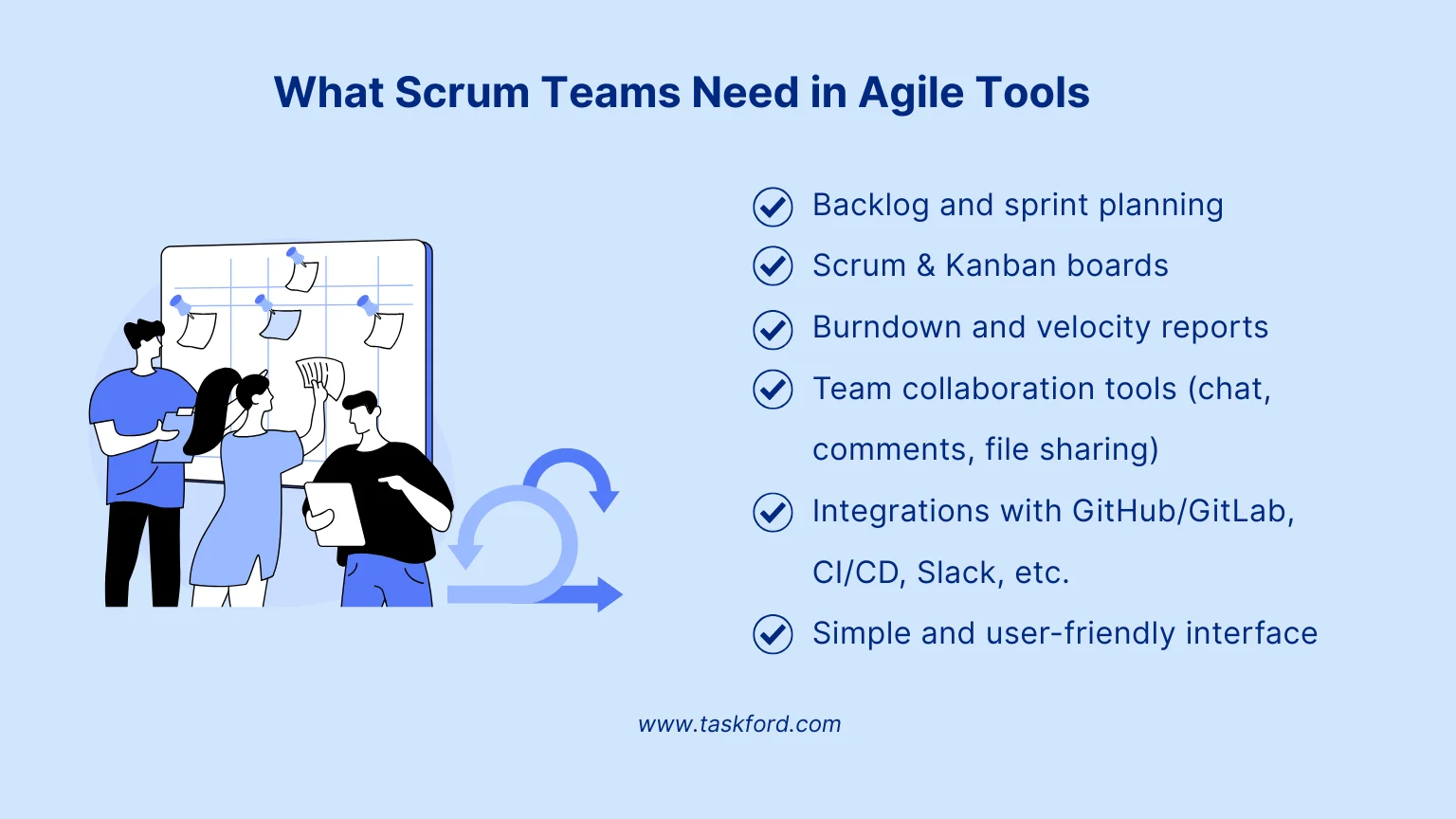
- Backlog and Sprint Management – A clear way to organize user stories, prioritize work, and plan sprints.
- Agile Boards – Scrum and Kanban boards that make progress visible at a glance.
- Reports and Metrics – Burndown charts, velocity tracking, and dashboards to keep an eye on team performance.
- Collaboration Features – Comments, file sharing, and notifications to keep discussions close to the work.
- Integrations with Dev Tools – GitHub, GitLab, CI/CD pipelines, or Slack, so development and communication stay connected.
- Ease of Use – A clean, intuitive interface that doesn’t require weeks of training.
In short, Scrum teams need an alternative to Jira that reduces overhead and lets them focus on delivering value every sprint, rather than managing the tool itself.
Best Jira Alternatives for Scrum Teams
When it comes to finding the best Jira alternatives for Scrum teams, it’s important to look beyond just the tool’s core features. The right alternative will depend on your team’s specific needs: whether you prioritize simplicity, integration with other tools, or scalability as your team grows. Here’s an in-depth look at some of the top Jira alternatives for Scrum teams:
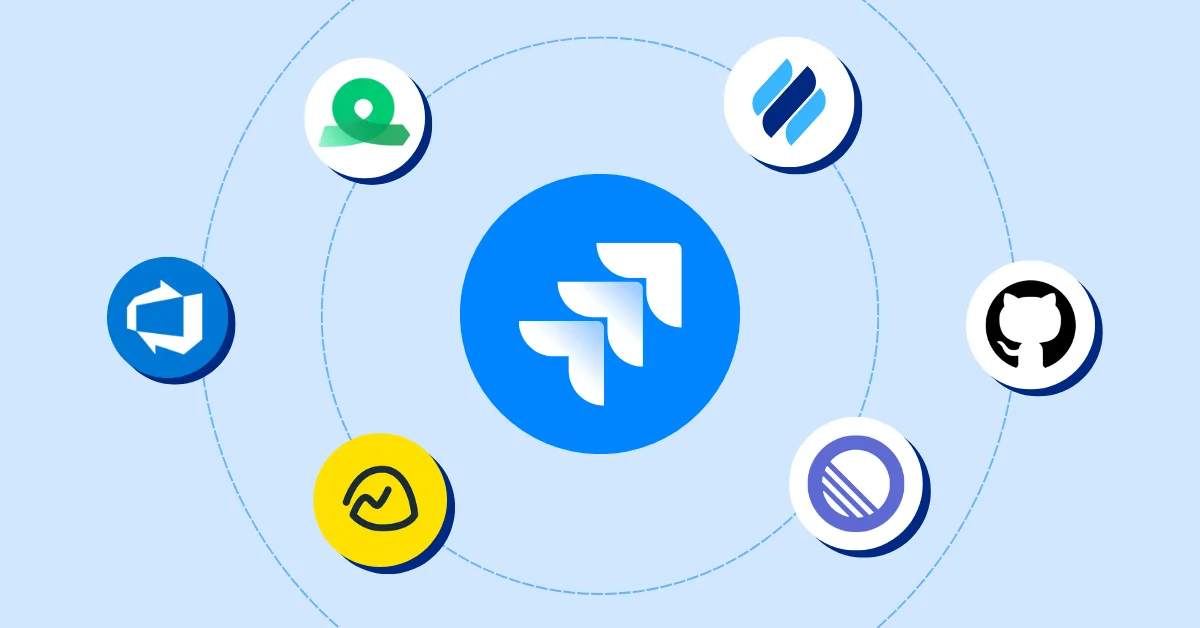
1. TaskFord
TaskFord is a comprehensive project management software that combines agile task tracking with advanced resource planning, making it ideal for teams of all sizes. It’s particularly beneficial for Scrum teams that need a centralized platform to manage both projects and resources. By blending agile functionality with resource management, TaskFord offers a hybrid solution for teams handling complex workflows.
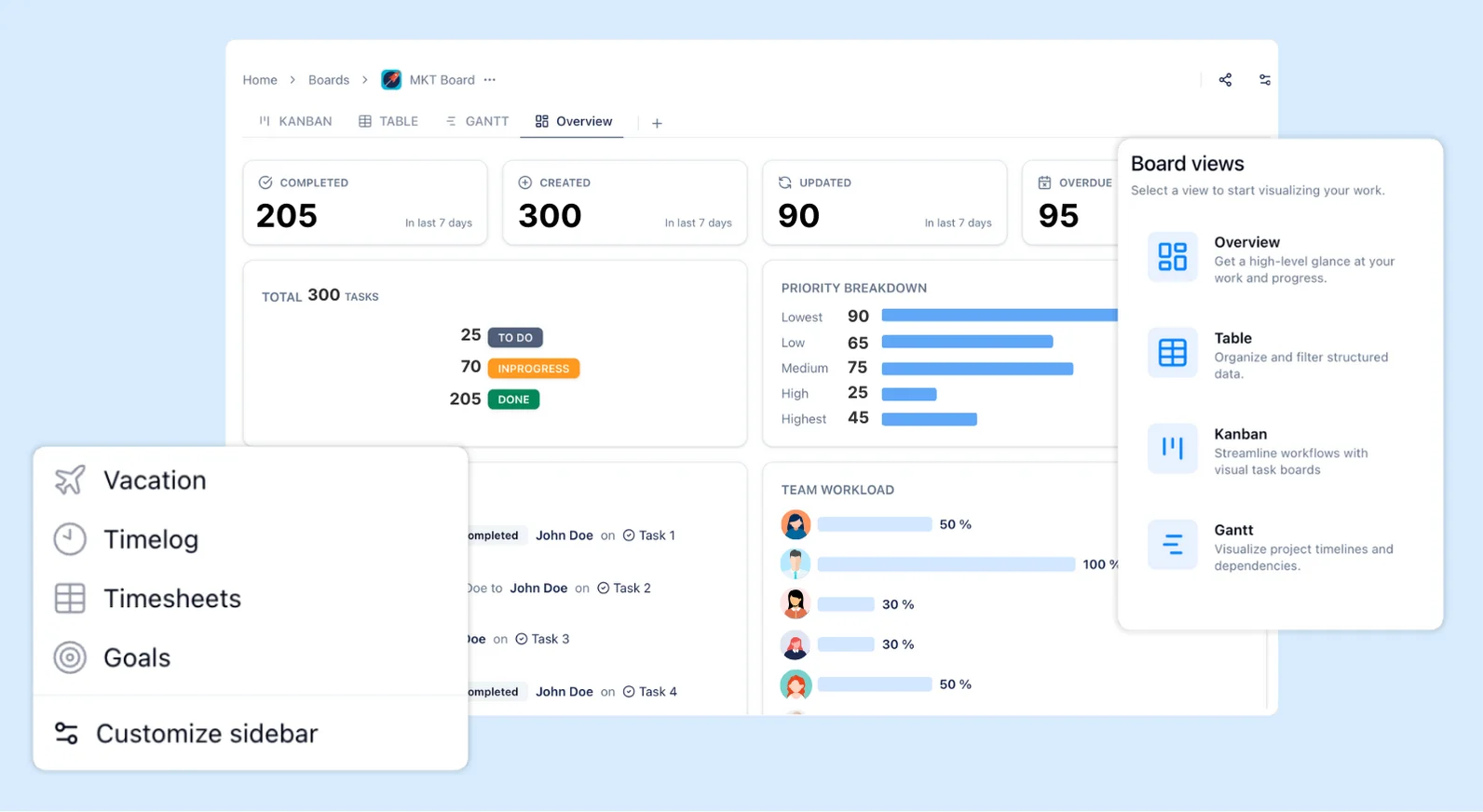
TaskFord’s Scrum Features:
- Sprint Planning: Organize and prioritize tasks for each sprint. TaskFord allows teams to set sprint goals, assign tasks, and track progress, ensuring that deadlines are met and backlogs don’t spill over into the next sprint.
- Backlog Management: Easily manage and refine your product backlog. TaskFord helps teams prioritize user stories and break down large features, ensuring a clean, organized backlog with real-time updates on task status.
- Visual Kanban Boards: Track task progress with customizable Kanban boards. With simple drag-and-drop functionality, teams can move tasks through different stages and create personalized views for better visibility and task management.
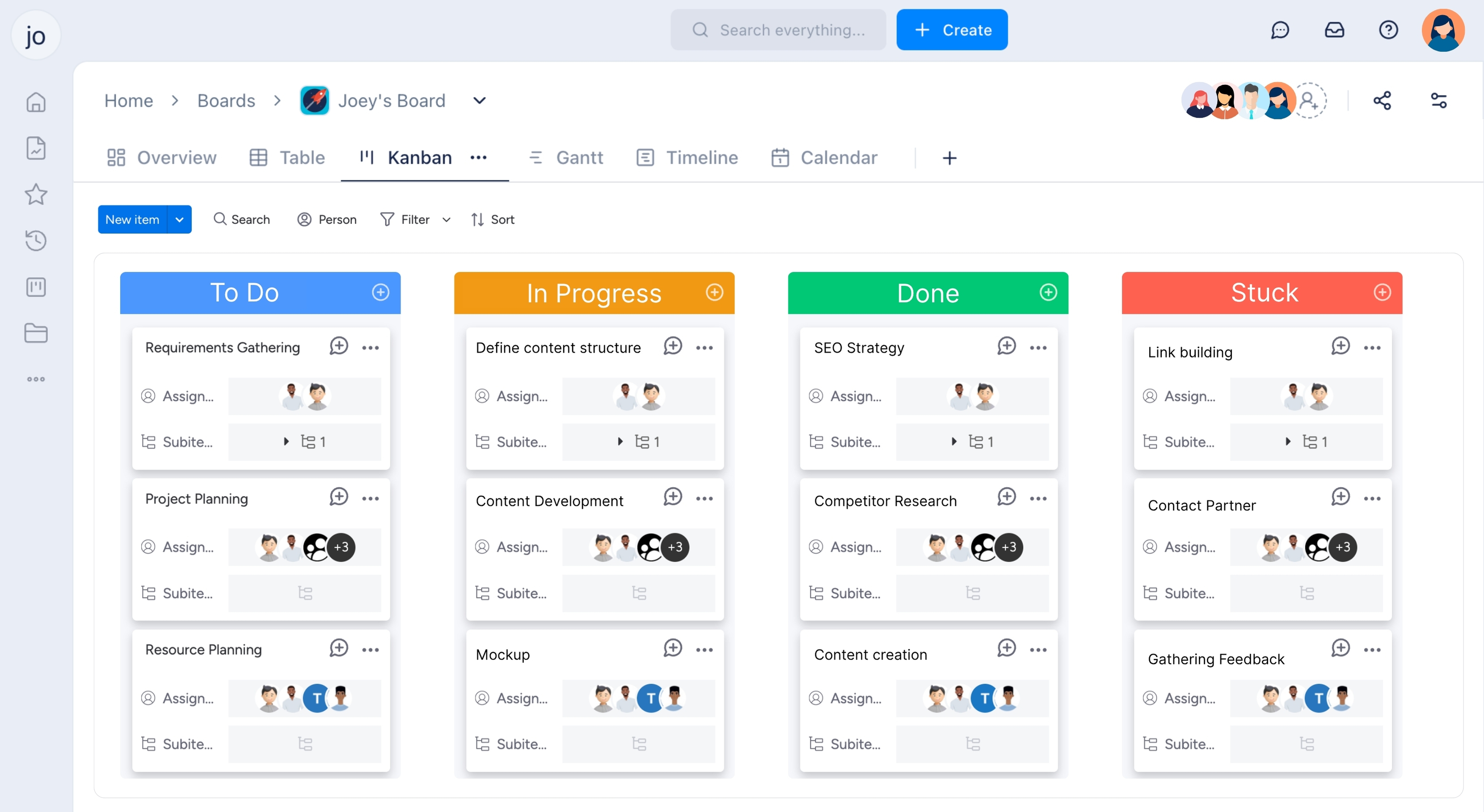
- Resource Allocation: Plan resources and track team member availability. TaskFord ensures that tasks are assigned based on individual capacity and skills, preventing overload and optimizing productivity.
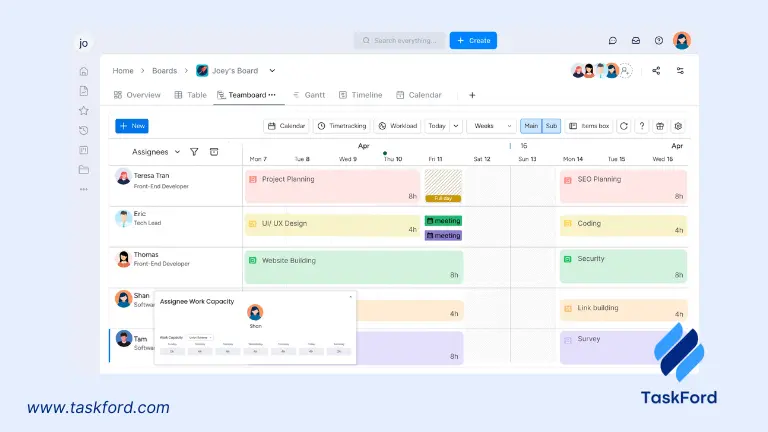
Pros and Cons
Pros:
- Combines agile task tracking with resource management, ideal for Scrum teams handling complex projects.
- Highly customizable workflows and Kanban boards to fit your team’s specific needs.
- In-depth reporting tools to track project timelines, resources, and milestones.
- User-friendly interface that simplifies sprint planning, backlog management, and task allocation.
Cons: Limited third-party app integrations compared to other alternatives.
2. monday dev (monday.com)
monday dev, part of monday.com, is a flexible work management tool designed for development teams. With intuitive visual boards and collaboration features, it’s ideal for Scrum teams looking for a simple yet powerful way to plan sprints, manage backlogs, and track progress.
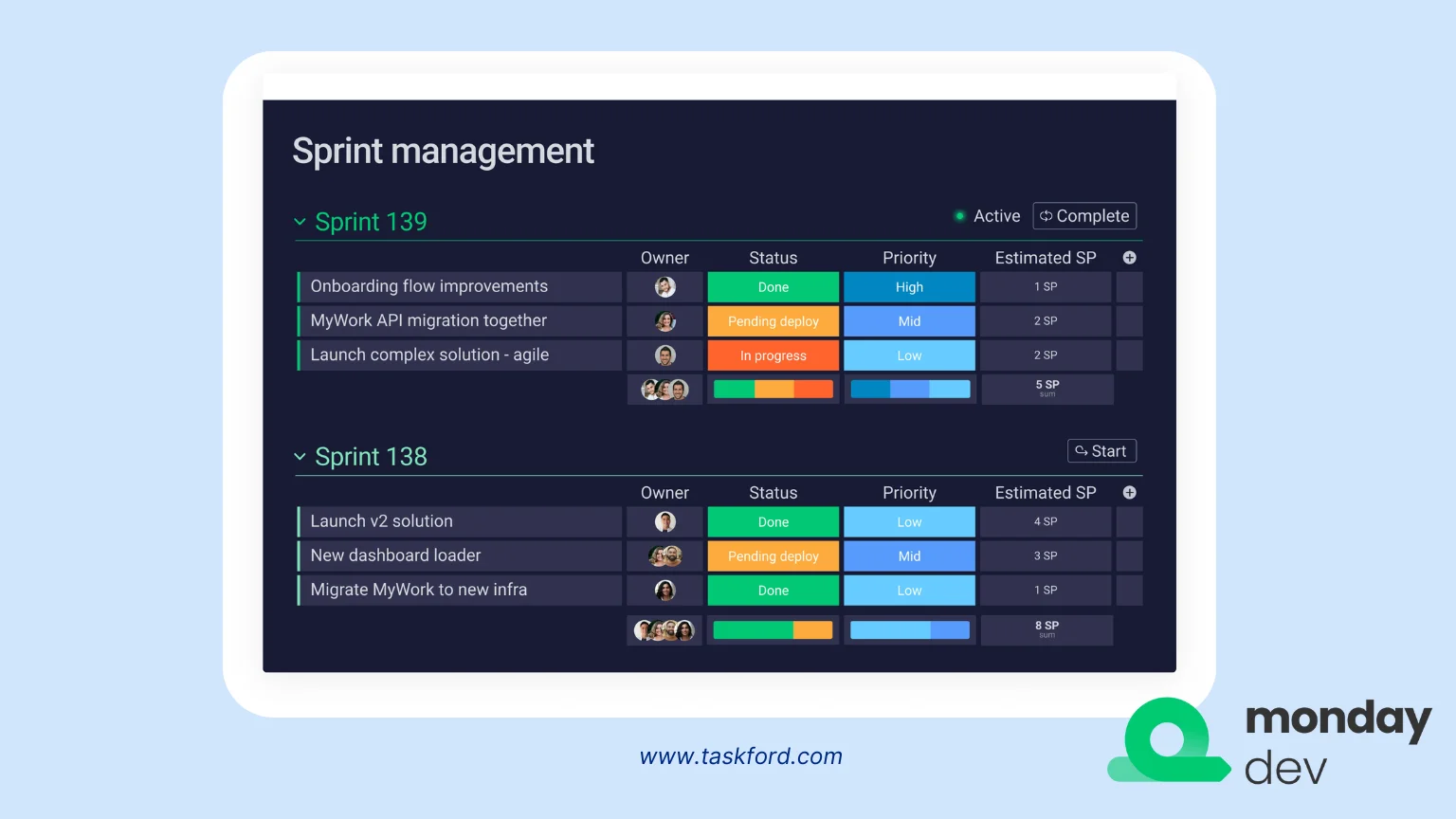
Scrum Features:
- Sprint Management: Plan and track sprints with customizable boards and automated progress tracking.
- Integrated Roadmapping: Visualize product roadmaps, linking Epics to daily tasks. Real-Time Reporting: Use dashboards to track velocity, burndown, and burnup charts.
- Seamless Integrations: Connect with GitHub, GitLab, Figma, and more to centralize workflows.
- Capacity Planning: Monitor team workload to balance sprint capacity.
Pros and Cons
Pros:
- All-in-one platform reduces the need for multiple tools.
- Intuitive interface encourages adoption across teams.
- No-code customization reduces administrative overhead.
- Great for cross-functional collaboration and hybrid methodologies.
Cons: May be too feature-rich for small teams or individuals who need only basic task management.
Pricing Plan
monday dev offers a 14-day free trial, with paid plans available that provide increasing functionality based on team needs.
3. Azure DevOps
Azure DevOps is a comprehensive suite from Microsoft, designed to support the entire development lifecycle. It’s perfect for Scrum teams with a focus on DevOps and integration, offering tools for planning, tracking, and collaboration, alongside powerful CI/CD pipelines.
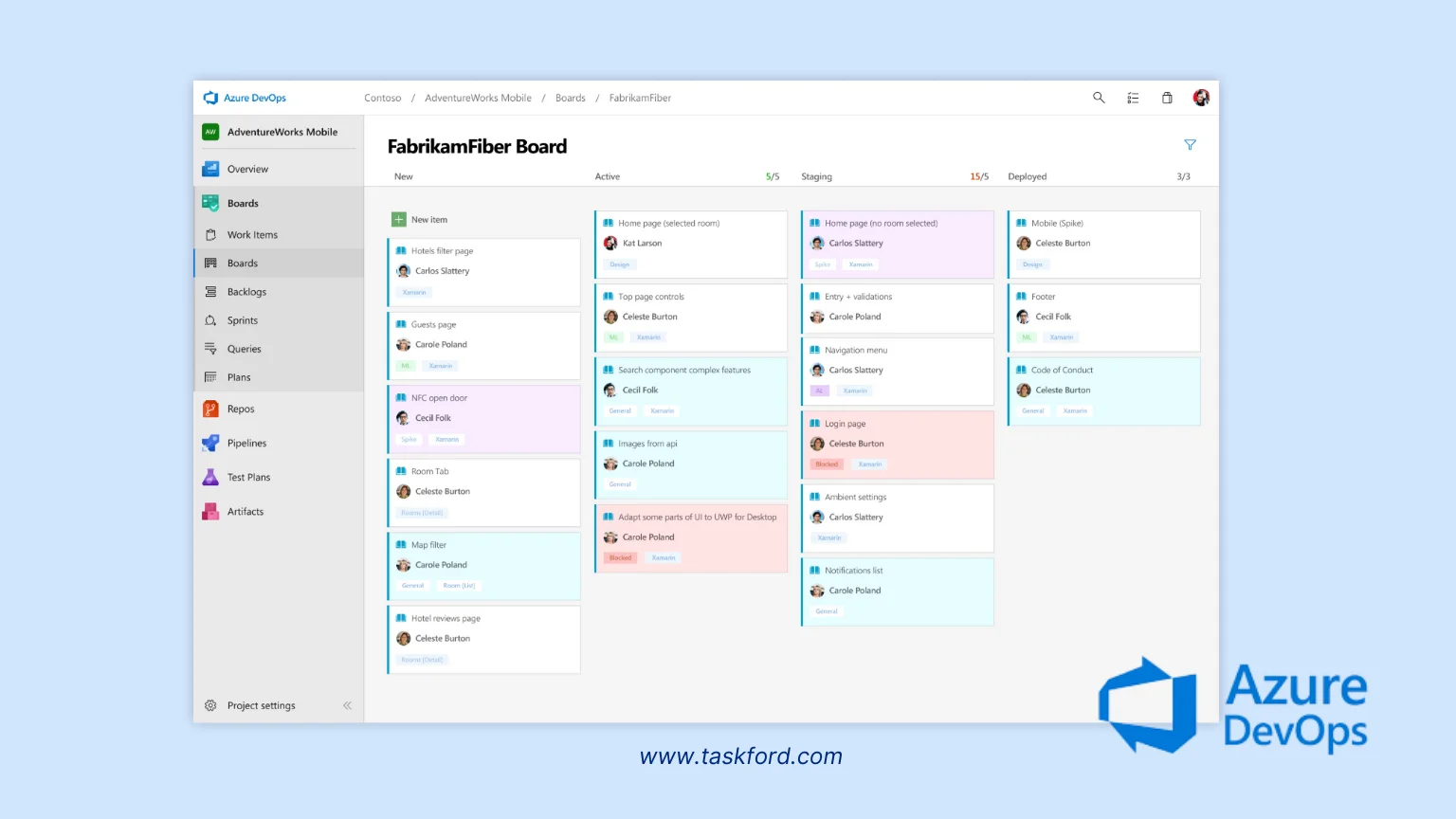
Scrum Features:
- Sprint Planning & Backlog Management: Prioritize tasks and organize sprints efficiently.
- Agile Boards: Customizable boards to track task progress in real-time.
- CI/CD Automation: Automates testing, building, and deployment for faster releases.
- Reporting & Metrics: Track progress with velocity and burndown charts.
Pros & Cons
Pros:
- Ideal for teams already using Microsoft tools and cloud infrastructure.
- Excellent integration with Azure and Visual Studio, making it a strong option for DevOps teams.
- Strong CI/CD capabilities for end-to-end development and deployment tracking.
Cons:
- It can be complex for non-technical teams or teams without a DevOps focus.
- Steeper learning curve compared to simpler tools like Trello or Asana.
Pricing Plan
Azure DevOps offers a free plan for up to 5 users. Paid plans start at $6/user/month for additional features and more users.
4. GitHub Issues
GitHub Issues is a lightweight task management tool integrated into GitHub repositories, perfect for small Scrum teams. It helps track tasks, bugs, and user stories while linking directly to code changes and pull requests.
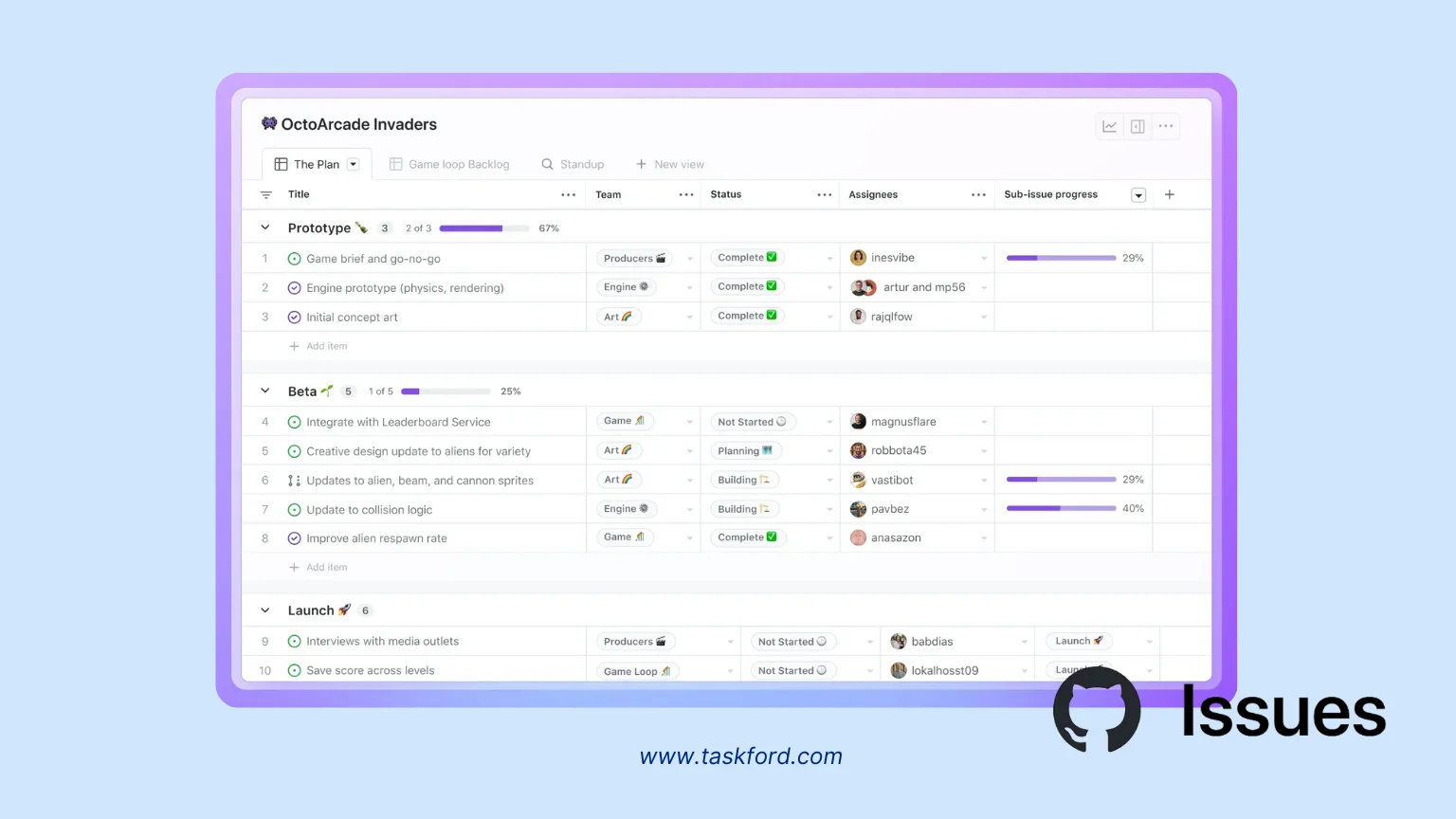
Scrum Features:
- Backlog Management: Create, prioritize, and organize tasks and user stories.
- Task Tracking: Use labels, milestones, and assignments to track progress.
- GitHub Integration: Link issues to commits and pull requests for seamless tracking.
- Progress Monitoring: Simple board view for visualizing task status.
Pros & Cons
Pros:
- Free for public repositories.
- Seamless integration with GitHub.
- Easy setup and minimal learning curve.
Cons:
- Limited reporting features like burndown or velocity charts.
- Not ideal for large teams or complex workflows.
Pricing Plan
Free for public repositories; private repositories start at $4/user/month.
5. Basecamp
Basecamp is a simple and intuitive project management tool focused on team collaboration. While not specifically built for Scrum, it can be adapted for small teams looking to manage tasks, communicate, and stay organized.
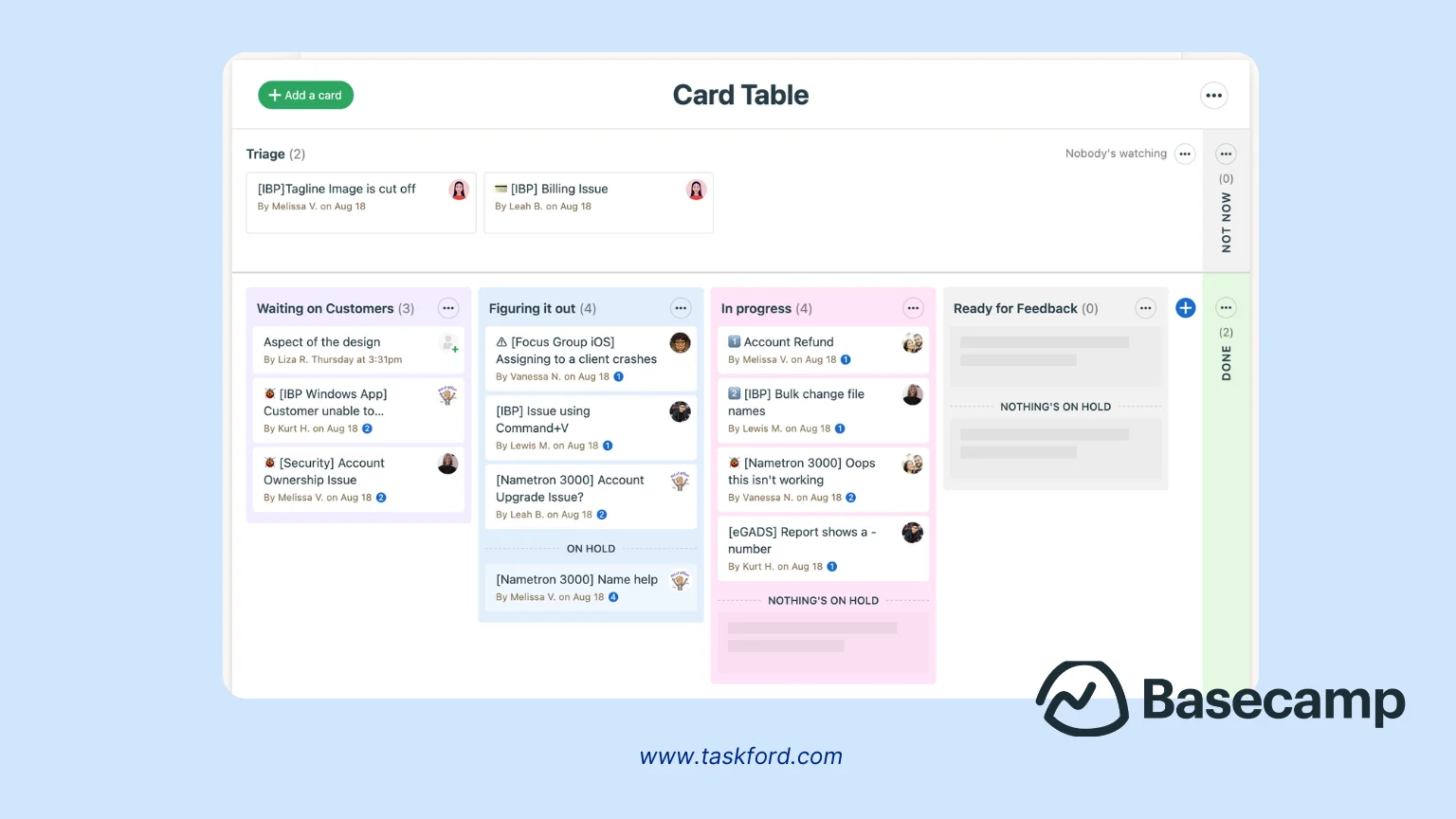
Scrum Features:
- Task Management: Create to-do lists and assign tasks to team members.
- Project Boards: Use visual boards to organize and track tasks.
- Team Collaboration: Chat, file sharing, and message boards to enhance communication.
- Simple Calendar: Track deadlines and milestones with a basic calendar view.
Pros & Cons:
Pros:
- Easy to use with minimal setup required.
- Great for small teams or simple projects.
- Affordable, flat pricing for unlimited users.
Cons:
- Lacks advanced Scrum features like burndown charts and velocity tracking.
- Not ideal for large teams or complex workflows.
Pricing:
Flat rate of $99/month for unlimited users and projects.
6. Linear
Linear is a fast, modern issue-tracking tool designed for agile teams. It focuses on simplicity and speed, making it ideal for small to mid-sized Scrum teams that need an efficient way to manage sprints and track progress.

Scrum Features:
- Sprint Planning: Create, organize, and track user stories for each sprint.
- Task Tracking: Use customizable workflows to track tasks from backlog to completion.
- Roadmap Visualization: Plan and visualize long-term goals and milestones.
- GitHub Integration: Seamlessly connects to GitHub for tracking code changes and pull requests.
Pros & Cons:
Pros:
- Clean, fast, and user-friendly interface.
- Strong integration with development tools like GitHub. Simple setup and minimal distractions.
Cons:
- Limited advanced features for larger teams or complex workflows.
- No built-in reporting features like burndown or velocity charts.
Pricing:
Starts at $8/user/month, with a free trial available.
Comparison Table of Jira Alternatives
| Tool | Sprint Planning | Backlog Management | Agile Boards | CI/CD Integration | Task Tracking | Best For |
|---|---|---|---|---|---|---|
| TaskFord | ✅ | ✅ | ✅ | ❌ | ✅ | Complex projects, larger teams |
| monday dev | ✅ | ✅ | ✅ | ❌ | ✅ | Visual teams, cross-functional work |
| Azure DevOps | ✅ | ✅ | ✅ | ✅ | ✅ | Dev-focused teams, Microsoft stack |
| GitHub Issues | ✅ | ✅ | ✅ | ✅ | ✅ | Small dev teams, GitHub-centric |
| Basecamp | ✅ | ✅ | ✅ | ❌ | ✅ | Small teams, simple projects |
| Linear | ✅ | ✅ | ✅ | ✅ | ✅ | Fast-moving, small to mid-sized teams |
How to Choose the Right Jira Alternative
When searching for a Jira alternative, it’s crucial to select a tool that effectively supports your Scrum workflow. Focus on agile capabilities, such as sprint planning, backlog management, and task prioritization, to ensure your team can deliver efficiently. Consider ease of use and adoption, so team members spend time on work instead of learning the tool. Ensure it integrates seamlessly with your existing development and collaboration tools to maintain a connected workflow.
Finally, think about scalability and flexibility—the right tool should grow with your team and adapt as your processes evolve.
Conclusion
Jira is a powerful tool, but it’s not always the perfect fit for every Scrum team. Depending on your team size, workflow, and project complexity, alternatives like TaskFord, monday dev, Azure DevOps, GitHub Issues, Basecamp, or Linear can provide a simpler, more focused, or more cost-effective solution.
When choosing a Jira alternative, focus on your team’s agile needs, integration requirements, ease of use, and scalability. The right tool can streamline your sprint planning, improve collaboration, and help your team deliver projects more efficiently.
Finding the right fit ultimately comes down to understanding your team’s priorities and selecting a platform that supports both your current workflow and future growth.
Continue Reading
- Jira vs Clickup - Feature-by-Feature Battle for Modern Teams
- Agile Project Management Sprint - From Planning to Retrospective
- Sprint Backlog - How to Prioritize Sprint Backlog: Who Is Accountable for Decisions?
- Backlog Grooming - What It Is and Why It Matters in Agile
- Agile Capacity Planning - How to Match Team Velocity with Real-World Workloads
Making work simpler,
smarter, and more connected
Join our waitlist and be notified first.

Subscribe for Expert Tips
Unlock expert insights and stay ahead with TaskFord. Sign up now to receive valuable tips, strategies, and updates directly in your inbox.



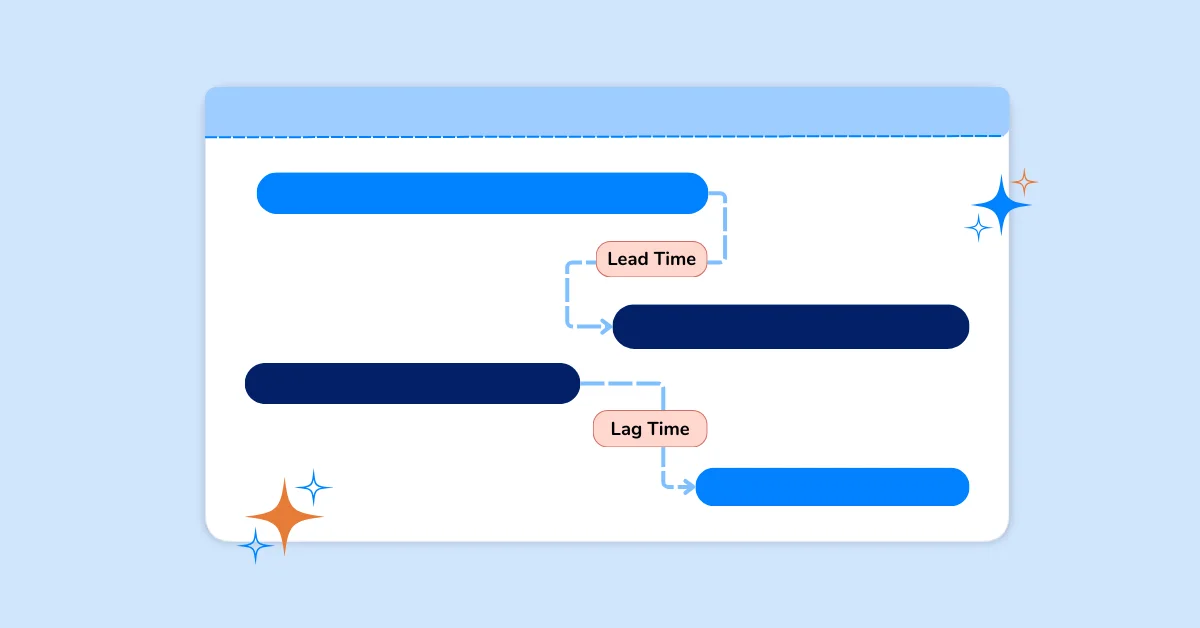
![How to Create a Winning Project Plan for IT Projects [10 Steps Included]](https://taskford.com/marketing/blog/how-to-create-a-project-plan.webp)

